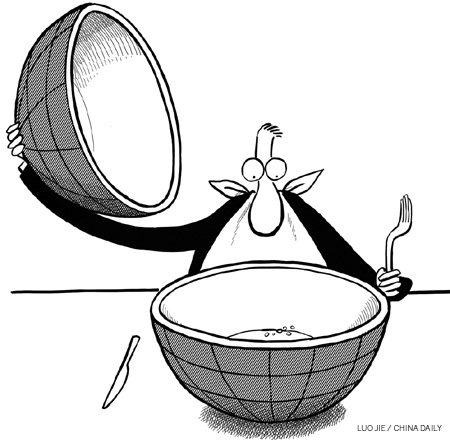Opinion
How to ensure food security
By Anthea Webb (China Daily)
Updated: 2010-08-18 07:45
 |
Large Medium Small |

This summer has been brutal. More than 1,200 people have lost their lives in China as a result of torrential rain and landslides; millions more have lost their homes and seen their farms inundated - and this on top of the worst drought in the south-west of the country earlier this year. We (World Food Programme China) extend our sincere condolences to the families who have lost their loved ones. And we understand the despair that farmers must feel as they watch their harvest disappear.
Sadly, the suffering is being felt across the globe. In Pakistan, 20 million people have been affected by massive flooding. In Russia, wildfires have cost countless lives and together with drought, reduced the harvest by up to 20 percent. In West Africa, drought has ravaged Niger and other countries of the Sahel, with as many as one in four young children acutely malnourished.
China's response has been exemplary. Not only has it mounted several massive simultaneous rescue and relief operations for its own people, but also it has been swift in sending relief to Pakistan, Russia and Niger, including $1 million through the World Food Programme (WFP).
Ominously, the effects of these natural disasters may be felt long after the immediate danger passes. Their impact on global grain prices is already being felt. Countries are beginning to introduce export restrictions on grain in an effort to control domestic prices. Expectations of higher prices to come may be causing some producers to hold onto their stocks. Speculators are rediscovering agricultural commodities.
News that China has imported more grain so far this year than in recent years has also attracted attention.
Are we on the cusp of another "global food crisis" like the one seen in 2008?
In many ways, the global food crisis never abated, it was simply overshadowed by the financial crisis.
In many developing countries, food prices have stayed high. In Tajikistan, wheat prices started out this year more than 100 percent higher than the average before the crisis. In Sri Lanka, even the poorest of the poor are expected to pay more than twice as much for rice, and the same goes for Benin, where the price of sorghum has more than tripled compared to the average price over the previous five years.
The global financial crisis left many families and governments, especially in developing countries, even more vulnerable to rise in food prices. Export earnings slumped and remittances from relatives working in cities or abroad dried up. So even in places where food prices stabilized, the poorest families had less money to spend.
Unnoticed by the rest of the world, the world hunger crisis that erupted in 2008 unleashed its full fury in many places only after the media had already moved on to cover the next crises in financial and trade markets. The consequences were devastating: In 2009 alone, more than 100 million people were added to the ranks of the hungry. More than 1 billion people suffer from hunger these days - more than ever before.
| ||||
But the news is not all bad. Plentiful harvests in 2009 allowed for some restocking of grain reserves. Fuel prices, which were a factor in the 2008 price rise, have not increased significantly, keeping production costs and demand for biofuels lower.
Developed countries' governments renewed their focus on food security, promising $20 billion assistance at the G8 meeting in L'Aquila, Italy, last year. Governments of developing countries were reminded of the centrality of agriculture to their economic growth and have pledged to invest more in food security.
Last week, at the Sino-African Agriculture Forum co-sponsored by the Communist Party of China and the Ministry of Agriculture, governments and ruling parties pledged to strengthen the already decades-long cooperation in agriculture, promote trade and investment.
And last month, the China Institute for International Strategic Studies convened a seminar at which some of the world's leading strategists, used to dealing with issues of international security, examined the potential threat posed by global food insecurity.
Strong political commitment such as that shown by China is fundamental for promoting global food security. It is the best chance we have of averting another, more predictable, tragedy emerging from this year's horrific natural disasters.
The author is director of the World Food Programme China.



